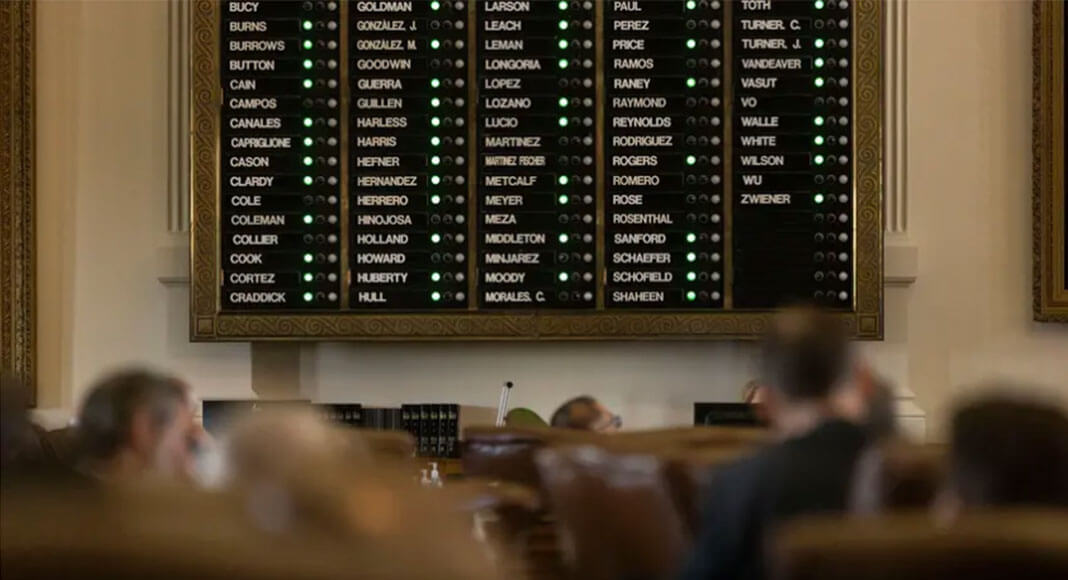
The Texas Tribune
BY PATRICK SVITEK AND CASSANDRA POLLOCK / THE TEXAS TRIBUNE
After a roughly six-week impasse, official business of the second special session is finally underway in the Texas House — and Gov. Greg Abbott’s agenda, including the GOP voting bill, is moving forward.
But it’s unclear what the Legislature will be able to accomplish with just two weeks left on the 30-day clock. Key legislative deadlines are coming. Member relationships are frayed. And while lawmakers decisively restored a quorum Monday, the Democratic caucus is fractured and some members are warning the quorum could be fragile.
Monday marked the most Democrats to be seen on the House floor since July when more than 50 members left the state for Washington, D.C., to block the GOP’s voting bill. However, many of those Democrats didn’t show up until after a quorum was officially established.
After a vote initially confirmed that 100 members were present — one more than the 99 currently needed to make a quorum — an additional 13 Democrats who had previously been absent returned to the floor. (There’s a total of 150 members of the Texas House, but two seats are open.)
Some of those Democrats justified their return by saying the fight had shifted back to the Texas Capitol instead of Washington, where members had camped out for weeks in a push to urge Congress to act on federal voting rights legislation.
“We’re in the next phase of the fight now, which means fighting here in the committee process and on the House floor,” Rep. Chris Turner, a Grand Prairie Democrat who chairs his party’s caucus in the lower chamber, told reporters after the House gaveled out for the day. “Obviously we always have every tool at our disposal, but right now the fight is here in the Texas Capitol.”
Rep. Toni Rose of Dallas, another Democrat who ended her protest of the House on Monday, said lawmakers who had been absent now had “an obligation to be here to fight for our constituents” once a quorum had been established.
Republicans, meanwhile, are eager to plow through items on Abbott’s agenda and some say floor debates on a number of bills could happen as soon as this week. Other items on the governor’s special session to-do list for lawmakers include changing the timeline for the 2022 primary elections, doling out federal COVID-19 relief money, overhauling the state’s bail system and pushing back against social media “censorship,” among other things.
“Our expectation is that we will move through a whole series of bills through committees and onto the calendar and bring them onto the House floor in the very near future — like later this week,” Rep. Jim Murphy of Houston, who chairs the House GOP Caucus, told The Texas Tribune on Monday.
The Senate has already gotten through a big chunk of Abbott’s 17-item agenda, and its presiding officer, Lt. Gov. Dan Patrick, said in a statement Monday the chamber “stands ready” to finish the job.
Abbott has vowed to call repeated special sessions until lawmakers complete his agenda.
Last week, the lower chamber reached a quorum for the first time in weeks, but drama ensued soon after it became apparent that not all 99 members who had registered as present in the chamber were physically on the floor.
Before the House met Monday evening, a group of 32 House Democrats who are apparently still protesting the session released a statement insisting that a quorum is not guaranteed going forward. A few of them were among those who returned to the floor later Monday.
“Some of our Democratic colleagues may be returning to the House floor intermittently to object and preserve a record on the voter intimidation and suppression bill, as well as other pieces of legislation which are harmful to vulnerable Texas families,” the statement said. “However, we and our allies and advocates recognize that any Member, at any time, has the right to break quorum should they deem it necessary.”
The House floor featured at least 15 new Democrats Monday, bringing the total number of Democrats on the House floor to roughly half of the 66-member caucus. The newest members to show up included Rose and Turner, as well as Reps. Yvonne Davis of Dallas, Ann Johnson of Houston, Alex Dominguez of Brownsville, Vikki Goodwin of Austin, John Bucy of Austin, Julie Johnson of Farmers Branch, Lina Ortega of El Paso, Rafael Anchía of Dallas, Jon Rosenthal of Houston, Sheryl Cole of Austin, Erin Zwiener of Driftwood, Mary Ann Perez of Houston and Donna Howard of Austin.
Some of those Democrats made their plans known over the weekend, saying that in light of Thursday’s breakthrough quorum, it was time for them to show up and fight against the elections bill and other GOP priorities.
On Sunday, Rep. Joe Deshotel, D-Beaumont, sent a letter to the returning Democrats that implored them to reconsider, asking them to hold off on contributing to quorum until bills reach the floor. Bills reach the floor after getting hearings in committees and being voted out by committees.
“Not until then can you do any of the things you list as reasons for your return,” Deshotel wrote.
Asked Monday whether there is enough time to debate and pass legislation, Anchía told reporters that “there’s more than enough time” to get through parts of Abbott’s agenda “that make everyday Texans’ lives better,” such as passing legislation to restore legislative funding or a bill to provide what is known as a “13th check” to retired teachers across Texas.
Another factor that could impact lawmakers moving legislation is the tensions between some members, particularly in a chamber that prides itself on bipartisanship and personal relationships.
Murphy, the GOP caucus chair, said he did not “see that as having a significant impact” on the legislative process.
“I think a lot of voting on amendments and bills comes down to a math issue,” he said. “If Republicans have a majority, I suspect they’ll prevail on a number of issues.”
After the House made a quorum last week, committee hearings were scheduled almost immediately after for over the weekend. By Monday evening, a House committee had already voted out the GOP elections bill.
At the start of that hearing, Rep. Andrew Murr, the Junction Republican carrying the legislation, moved to replace the language in Senate Bill 1 with the House’s version of the legislation — meaning the lower chamber would be starting over with the same version of the bill that first pushed the chamber into a weekslong game of legislative brinkmanship.
Brought by Republicans under the mantle of “election integrity,” the legislation remains opposed by voting rights groups and advocates for people with disabilities who on Monday reiterated their concerns that the bill would still undermine access for marginalized groups.
Democrats on the committee pressed Murr during Monday’s hearing over the possibility of amending the legislation to address some of the concerns raised over more than 12 hours of deliberations and public testimony, largely against the legislation, from an overnight hearing last month.
“We’re picking up right where we left off from and so those changes are yet to come,” Murr said.
reaches the House floor, though it remains unclear if those would go beyond fixing technical issues in the bill.
Other committees also met earlier Monday, including the House Appropriations Committee, which considered legislation that would reinstate funding for the legislative branch after Abbott vetoed those dollars from the state budget as retaliation for Democrats’ initial walkout in May over the elections bill.
The issue of funding the Legislature and some 2,100 state employees has been particularly controversial as a deadline to restore those dollars has neared. Abbott and other GOP leaders announced earlier this month that they had secured an extra month of funding, which buys the Legislature more time to pass a supplemental budget to restore those dollars.
The appropriations committee is scheduled to meet again Tuesday morning to consider additional legislation and could vote out that legislative funding bill, along with other special session agenda items, then.
Alexa Ura contributed to this report.













